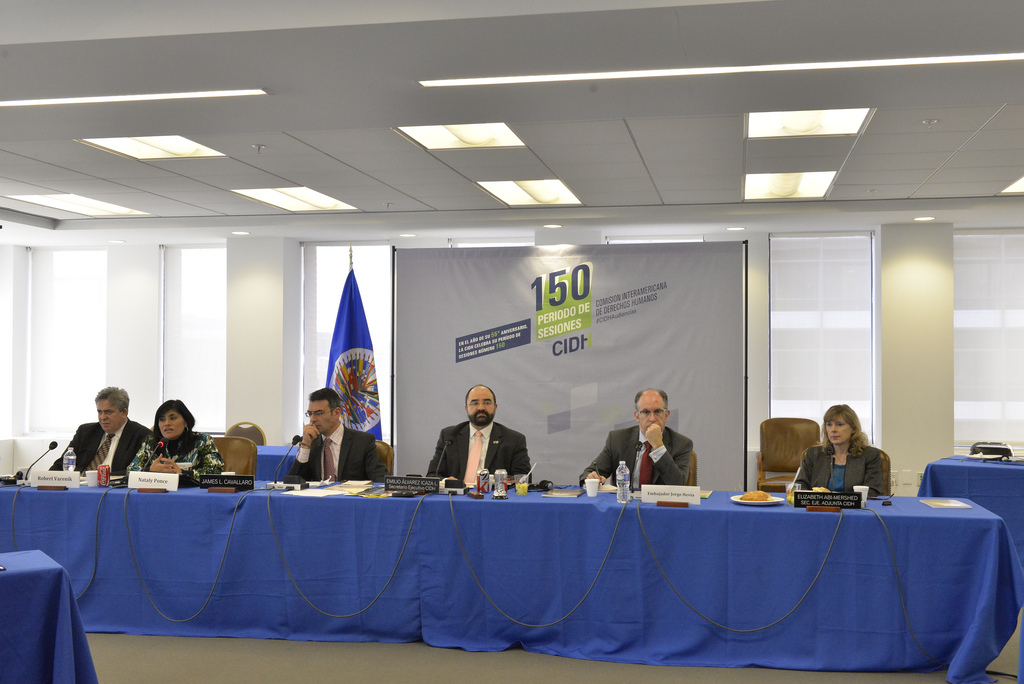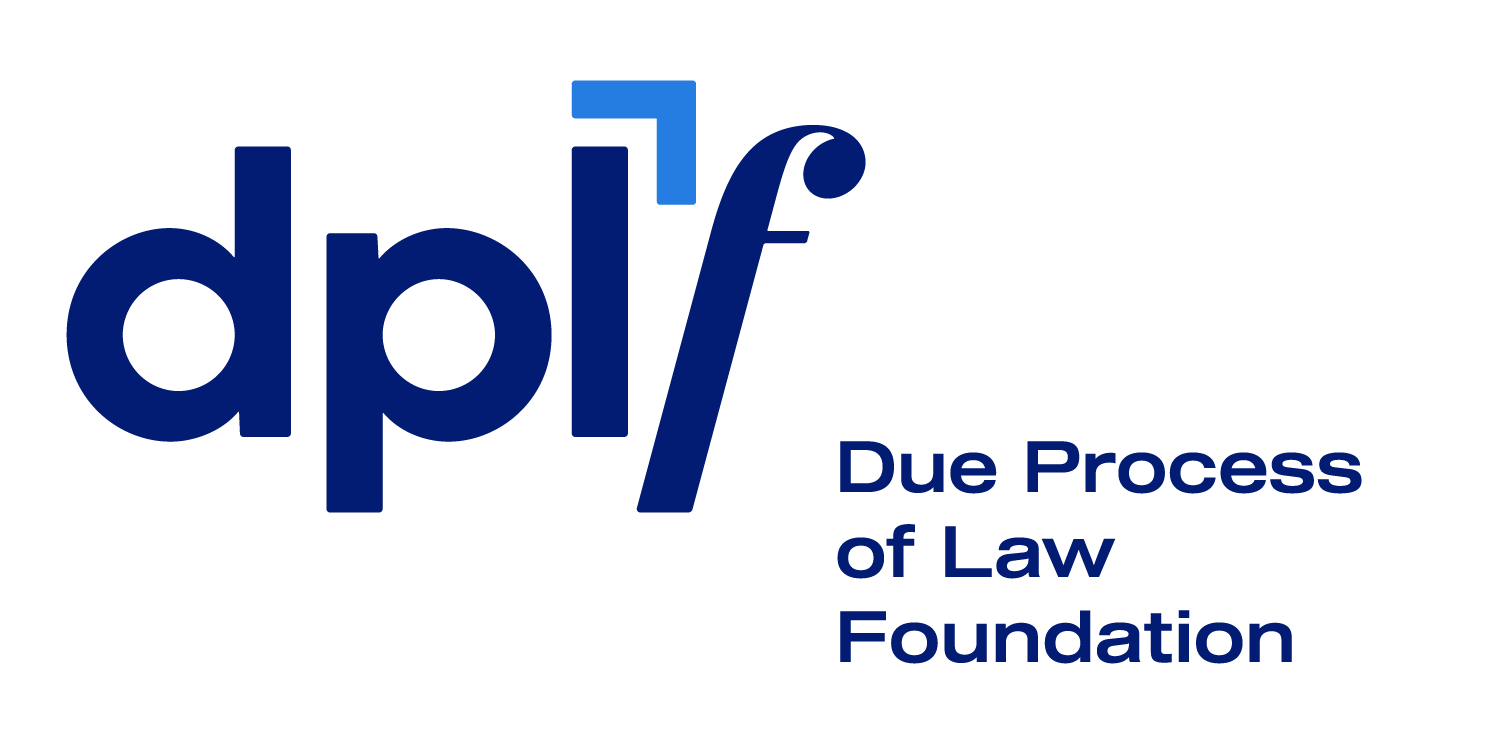
On the 26th of March the Inter-American Commission on Human Rights (IACHR) presented its Report on the Use of Pretrial Detention in the Americas, which was published in January of this year. The presentation was held during the IACHR’s 150th session period which took place from March 20 to April 4 of 2014. The event was co-organized by the Due Process of Law Foundation (DPLF), the Regional Network for Pre-Trial Justice in Latin America (of which DPLF is a member) and Open Society Foundations (OSF). IACHR President, Commissioner Tracy Robinson, gave the opening remarks in which she thanked the former IACHR Rapporteur on the Rights of Persons Deprived of Liberty, Rodrigo Escobar Gil, and his staff in the elaboration of the report. The current Rapporteur on the Rights of Persons Deprived of Liberty, Commissioner James Cavallaro, underscored the importance of the States approve the legislative measures and public policies necessary to guarantee precautionary and exceptional nature of preventive detention. Nataly Ponce, representing the Network for Pre-Trial Justice and Robert Varenik of the Open Society Justice Initiative (OSJI) commented on the report.For DPLF and the Network, this report represents significant steps forward in the development of pretrial detention standards including issues such as judicial control, periodic review of pre-trial detention, and the independence of justice operators at the time of issuing pre-trial detention orders. The report’s recommendations on the urgent need to prioritize alternative measures as opposed to pre-trial detention, the need for indicators to measure progress in the exceptional use of this measure, the need for developing clear and transparent judicial communication policies, and the need to prohibit catalogs (or lists) of crimes that require the automatic imposition of pre-trial detention, among others, should be regarded as a roadmap for States in the region. The Network will follow the report’s impact, accompanying States themselves and civil society as a way to ensure that pre-trial justice guarantees not only the presumption of innocence, but also effectiveness in the administration of justice.
 On the 26th of March the Inter-American Commission on Human Rights (IACHR) presented its Report on the Use of Pretrial Detention in the Americas, which was published in January of this year. The presentation was held during the IACHR’s 150th session period which took place from March 20 to April 4 of 2014. The event was co-organized by the Due Process of Law Foundation (DPLF), the Regional Network for Pre-Trial Justice in Latin America (of which DPLF is a member) and Open Society Foundations (OSF). IACHR President, Commissioner Tracy Robinson, gave the opening remarks in which she thanked the former IACHR Rapporteur on the Rights of Persons Deprived of Liberty, Rodrigo Escobar Gil, and his staff in the elaboration of the report. The current Rapporteur on the Rights of Persons Deprived of Liberty, Commissioner James Cavallaro, underscored the importance of the States approve the legislative measures and public policies necessary to guarantee precautionary and exceptional nature of preventive detention. Nataly Ponce, representing the Network for Pre-Trial Justice and Robert Varenik of the Open Society Justice Initiative (OSJI) commented on the report.For DPLF and the Network, this report represents significant steps forward in the development of pretrial detention standards including issues such as judicial control, periodic review of pre-trial detention, and the independence of justice operators at the time of issuing pre-trial detention orders. The report’s recommendations on the urgent need to prioritize alternative measures as opposed to pre-trial detention, the need for indicators to measure progress in the exceptional use of this measure, the need for developing clear and transparent judicial communication policies, and the need to prohibit catalogs (or lists) of crimes that require the automatic imposition of pre-trial detention, among others, should be regarded as a roadmap for States in the region. The Network will follow the report’s impact, accompanying States themselves and civil society as a way to ensure that pre-trial justice guarantees not only the presumption of innocence, but also effectiveness in the administration of justice.
On the 26th of March the Inter-American Commission on Human Rights (IACHR) presented its Report on the Use of Pretrial Detention in the Americas, which was published in January of this year. The presentation was held during the IACHR’s 150th session period which took place from March 20 to April 4 of 2014. The event was co-organized by the Due Process of Law Foundation (DPLF), the Regional Network for Pre-Trial Justice in Latin America (of which DPLF is a member) and Open Society Foundations (OSF). IACHR President, Commissioner Tracy Robinson, gave the opening remarks in which she thanked the former IACHR Rapporteur on the Rights of Persons Deprived of Liberty, Rodrigo Escobar Gil, and his staff in the elaboration of the report. The current Rapporteur on the Rights of Persons Deprived of Liberty, Commissioner James Cavallaro, underscored the importance of the States approve the legislative measures and public policies necessary to guarantee precautionary and exceptional nature of preventive detention. Nataly Ponce, representing the Network for Pre-Trial Justice and Robert Varenik of the Open Society Justice Initiative (OSJI) commented on the report.For DPLF and the Network, this report represents significant steps forward in the development of pretrial detention standards including issues such as judicial control, periodic review of pre-trial detention, and the independence of justice operators at the time of issuing pre-trial detention orders. The report’s recommendations on the urgent need to prioritize alternative measures as opposed to pre-trial detention, the need for indicators to measure progress in the exceptional use of this measure, the need for developing clear and transparent judicial communication policies, and the need to prohibit catalogs (or lists) of crimes that require the automatic imposition of pre-trial detention, among others, should be regarded as a roadmap for States in the region. The Network will follow the report’s impact, accompanying States themselves and civil society as a way to ensure that pre-trial justice guarantees not only the presumption of innocence, but also effectiveness in the administration of justice.
